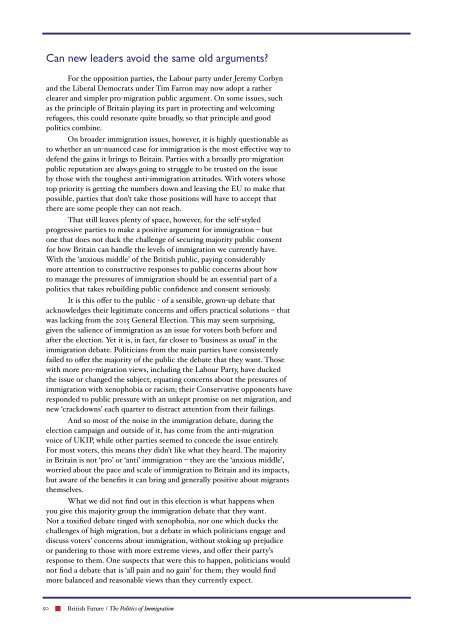THE POLITICS OF IMMIGRATION
The-politics-of-immigration
The-politics-of-immigration
Create successful ePaper yourself
Turn your PDF publications into a flip-book with our unique Google optimized e-Paper software.
Can new leaders avoid the same old arguments?<br />
For the opposition parties, the Labour party under Jeremy Corbyn<br />
and the Liberal Democrats under Tim Farron may now adopt a rather<br />
clearer and simpler pro-migration public argument. On some issues, such<br />
as the principle of Britain playing its part in protecting and welcoming<br />
refugees, this could resonate quite broadly, so that principle and good<br />
politics combine.<br />
On broader immigration issues, however, it is highly questionable as<br />
to whether an un-nuanced case for immigration is the most effective way to<br />
defend the gains it brings to Britain. Parties with a broadly pro-migration<br />
public reputation are always going to struggle to be trusted on the issue<br />
by those with the toughest anti-immigration attitudes. With voters whose<br />
top priority is getting the numbers down and leaving the EU to make that<br />
possible, parties that don’t take those positions will have to accept that<br />
there are some people they can not reach.<br />
That still leaves plenty of space, however, for the self-styled<br />
progressive parties to make a positive argument for immigration – but<br />
one that does not duck the challenge of securing majority public consent<br />
for how Britain can handle the levels of immigration we currently have.<br />
With the ‘anxious middle’ of the British public, paying considerably<br />
more attention to constructive responses to public concerns about how<br />
to manage the pressures of immigration should be an essential part of a<br />
politics that takes rebuilding public confidence and consent seriously.<br />
It is this offer to the public - of a sensible, grown-up debate that<br />
acknowledges their legitimate concerns and offers practical solutions – that<br />
was lacking from the 2015 General Election. This may seem surprising,<br />
given the salience of immigration as an issue for voters both before and<br />
after the election. Yet it is, in fact, far closer to ‘business as usual’ in the<br />
immigration debate. Politicians from the main parties have consistently<br />
failed to offer the majority of the public the debate that they want. Those<br />
with more pro-migration views, including the Labour Party, have ducked<br />
the issue or changed the subject, equating concerns about the pressures of<br />
immigration with xenophobia or racism; their Conservative opponents have<br />
responded to public pressure with an unkept promise on net migration, and<br />
new ‘crackdowns’ each quarter to distract attention from their failings.<br />
And so most of the noise in the immigration debate, during the<br />
election campaign and outside of it, has come from the anti-migration<br />
voice of UKIP, while other parties seemed to concede the issue entirely.<br />
For most voters, this means they didn’t like what they heard. The majority<br />
in Britain is not ‘pro’ or ‘anti’ immigration – they are the ‘anxious middle’,<br />
worried about the pace and scale of immigration to Britain and its impacts,<br />
but aware of the benefits it can bring and generally positive about migrants<br />
themselves.<br />
What we did not find out in this election is what happens when<br />
you give this majority group the immigration debate that they want.<br />
Not a toxified debate tinged with xenophobia, nor one which ducks the<br />
challenges of high migration, but a debate in which politicians engage and<br />
discuss voters’ concerns about immigration, without stoking up prejudice<br />
or pandering to those with more extreme views, and offer their party’s<br />
response to them. One suspects that were this to happen, politicians would<br />
not find a debate that is ‘all pain and no gain’ for them; they would find<br />
more balanced and reasonable views than they currently expect.<br />
50 British Future / The Politics of Immigration


